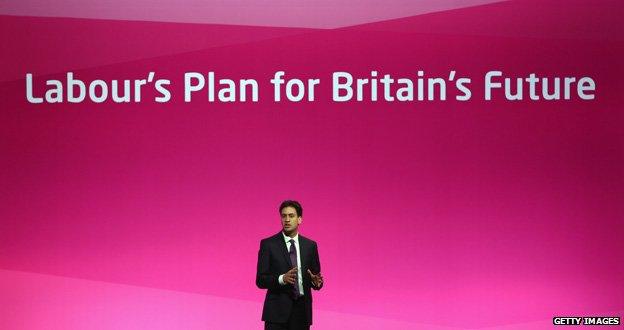Does Labour have the cash to expand the NHS?
- Published
- comments

Soak the London metropolitan rich and other putative baddies to pay for the NHS.
That will be the, perhaps, quaintly old-fashioned leftist and populist message of Ed Miliband's speech to Labour's conference today.
It is a throwback, a return to yesteryear's Labour - a bit of attempted rabble-rousing to give a lift to a conference that thus far has had only a little more oomph than a convention of actuaries.
The flatness of the conference is a bit incongruous, given that we are only months from an election that this party is set to win, if the opinion polls don't lie.
So will Miliband set a cold and characterless barn of a hall in Manchester ablaze with his missionary zeal and restore - in his words - people's "faith in the future"?
He won't and cannot claim the billion pounds or so from the mansion tax alone would reinvigorate an NHS whose annual budget for England alone is a touch under £100bn. The tax would not cover annual inflation in medical services, let alone a looming financial black hole that Labour fears is about to yawn open.
I would expect him, therefore, to announce there will also be other taxes hypothecated for health. It would not be a surprise if they included a so-called hedge-fund tax, which Ed Balls nodded to on yesterday's Today Programme.
As for the mansion tax, it will not be without its technical difficulties. One is around valuation. There should be no difficulty for HMRC in identifying £10m homes in Kensington and Mayfair. But there are many properties - well in London, anyway - whose value is around the £2m threshold. And proving that a home is worth a pound or so more than £2m rather than a pound less will be more art than science.
If the idea takes hold that Labour is on course to form the next government, the capital is likely to see a spate of housing deals at around £1.95m. And the purchasers will doubtless be praying - unusually - for their bit of the housing market to stagnate for a bit.
Even if manipulation of prices does not result in Labour receiving less from the tax than it hopes, there is a second problem. This is that the party is not proposing to eject from their homes those lacking the income to pay the tax.
As I understand it, Labour will allow cash-poor mansion owners to roll up the tax they owe, and pay it only when they sell up or die. Which means a portion of the NHS increment will have to be borrowed against the security of a long-term tax liability.
But for all the eccentricities of how Labour proposes to pay for its NHS promise, it can be characterised as a classic pre-election goodie.
That cannot be said of the rest of what Miliband styles as his "goals for Britain's future".
These are all unambiguously 10-year, two-parliament projects. Which in a world where, as he points out, many despair of politics and politicians is either a courageous or a foolhardy admission that there is little governments can do to improve our lives in the short term.
Miliband's ambitions - to end a flatlining of living standards that pre-dated the crash of 2008, to see as many young people on apprenticeships as in university, to see built more than 200,000 new homes a year, to create more than a million new high tech jobs in the "green" economy - may resonate.
They are an expression of his serious and thoughtful personality, the authentic Miliband. But the risk may be that they are a touch too ponderous and worthy for a modern politics in which success is measured in social media "likes" and retweets.
These days, 10 minutes is a long time in politics and a week is a lifetime. There will be applause for Miliband's attempt to look beyond tomorrow's headlines to the Britain of 2024. But will there be excitement?
PS, If you were bemused by why the shadow chancellor Ed Balls had as the centrepiece of his speech to conference yesterday a rather dour message that there will be another year of real cuts to the value of child benefit, the explanation is not that this Ed wishes to blow up the other Ed's hopes of entering No 10.
Balls apparently believes no-one will take him seriously in his avowals that the economy would be as safe in his hands as in Osborne's unless they feel he is hurting them directly.
Having been in power during the recent boom-and-bust years, Labour is seen as fiscally feeble, the party of easy spending promises and cowardice when it comes to cuts and belt-tightening.
So it is apparently good for Balls' credibility to be seen to be mean.
But this is all about symbolism, because - as I pointed out here yesterday - the money actually saved by limiting the rise in child benefit is equivalent to less than the current weekly increment to the national debt.